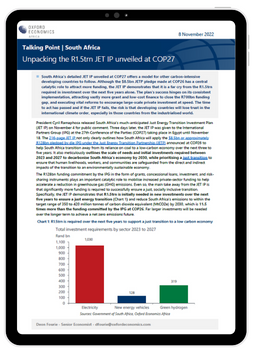Unpacking South Africa’s R1.5trn JET IP unveiled at COP27

South Africa’s Just Energy Transition Investment Plan (JET IP) shows what a roadmap to a socially inclusive and low-carbon economy looks like. It provides a realistic assessment of investment needs, encompasses details of those investments, and takes into consideration the country’s socioeconomic situation. It will also make climate financiers’ purses shudder. The immensity of the investments required means that neither government nor bilateral/multilateral partners will be able to foot the bill, meaning a central aim of the plan is to catalyse private sector involvement. The plan offers important learnings for other developing countries seeking to attain environmental sustainability while fostering improved social, economic, and developmental outcomes.
What you will learn:
- South Africa’s JET IP unveiled at COP27 offers a model for other indebted, fiscally constrained, and carbon-intensive countries to follow to advance environmentally sustainable and socially inclusive development, while avoiding economic calamity as the world inevitable shifts away from fossil fuels.
- The plan demonstrates that the $8.5bn JETP pledge made at COP26 is a far cry from the R1.5trn required in investment over the next five years alone. The JET IP’s success hinges on its consistent implementation, attracting vastly more grant and low-cost finance to close the R700bn funding gap, and executing vital reforms to encourage large-scale private investment at speed.
- The plan will be closely watched by other highly indebted and carbon-intensive economies, while its successful execution will have important implications for retaining trust in international efforts to limit the worst impacts of global climate change.
Tags:
Related Services

Service
African and Middle Eastern Cities Forecasts
Comprehensive data and forecasts for major cities in Africa and the Middle East.
Find Out More
Service
Africa Forecasting Service
Comprehensive analysis of immediate and long-term economic and political prospects to inform investment strategies, expansion and African operations through forecasts and commentary by country, industry, and city.
Find Out More
